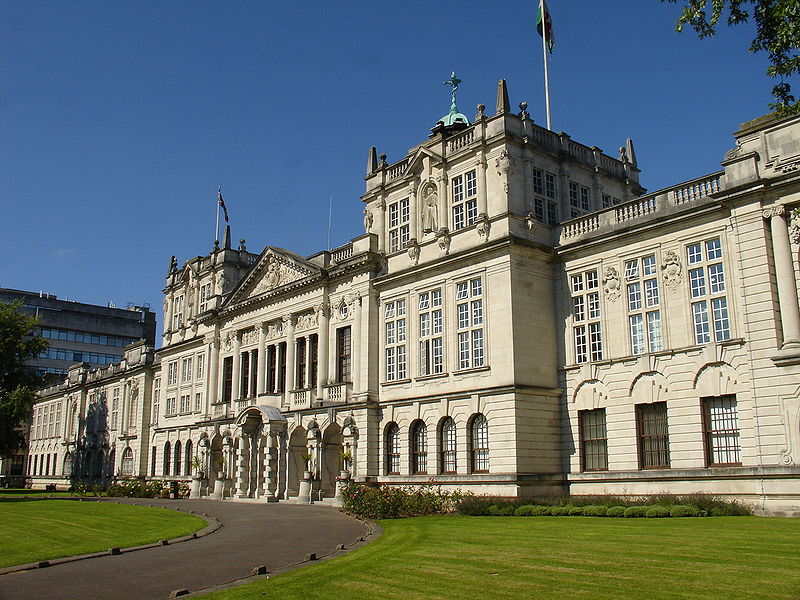The pace of cuts, commercialisation and techno-speculation at the Welsh flagship institution risk its collapse.
What will a “leaner and more efficient” Cardiff University look like? Cardiff University’s executive board has set out their vision for ‘digital transformation’ in Wales in 2035, where “digital technology is all-pervasive, with quantum computing and powerful AIs; gene-editing drives health improvement; and synthetic biology drives economic growth.”
Calling themselves ‘disruptors’, the executive board’s ‘Academic Futures’ strategy appears to focus on hunting commercial teaching and research contracts from global corporations, opening up ‘satellite’ campuses in Kazakhstan, Malaysia and Singapore trading on the Russell Group brand, and making a hasty and wide-eyed pivot towards technology. In Cardiff itself, the university is rolling out a quickly-cobbled run of new courses. This includes a new MA in AI and Digital Media Production that only requires a 2.2 in any subject for entry, running from September 2025. The programme lead job for this as-yet-undesigned course was still being advertised in April. In Astana in Kazakhstan, a new Cardiff University building has popped up in the last month between a Toyota dealership and a petrol station, and is now holding open days for $15,000 per year degrees in Exploration Geology, Business and Civil Engineering.
Deep cuts to the humanities and social sciences are a fundamental financial risk to the university, not least for their cross-subsidies to the sciences.
Back in Cardiff, the first step in building this new form of the university has been cuts of around 280 academic jobs and at least a dozen programmes, mostly from the arts and humanities, in a four-month manufactured crisis that initially placed two-thirds of all academic staff at risk of redundancy. Specifically, the wrecking ball is now coming for German, Italian, Portuguese, Religion and Ancient History, which are still all facing closure despite the university’s press spin in May 2025. The cuts to languages will mean that Wales has no degree level courses in Portuguese. Academics in the geography, planning and social sciences departments also remain at risk of redundancy. Deep cuts to the humanities and social sciences are a fundamental financial risk to the university, not least for their cross-subsidies to the sciences. But this is only phase one in a busy programme of new projects that (in the words of Chief Transformation Officer David Langley) risks “breaking a lot of things at once.”
While this is described as agile future-facing innovation, this mass reconstruction of the university is hardly in line with Welsh Government plans for sustainable economic growth ‘for a purpose, which is the wellbeing of people and planet.’ The executive team explicitly aims at a smaller university in Wales in exchange for flying academics out to satellite campuses fully funded by opaque Kazakh business interests. Their plans are silent on the social and environmental impacts of disinvestment in Wales while breaking their commitments to responsible climate investments and carbon reduction targets from staff travel.
Innovative. Informed. Independent.
Your support can help us make Wales better.
The planned investments in Wales also raise significant ethical questions. In a 2024 essay, Vice Chancellor Wendy Larner highlights arms manufacturer BAE Systems as well as Barclays and IBM as partners not just in research but in co-run degree programmes, and positively cites Thiel Fellowships. All of these companies are heavily invested in Israel’s military investments and surveillance systems, and Thiel Fellowships are funded by the techno-fascist Peter Thiel who is also known to associate with promoters of “race science.” While some higher educational institutions are divesting from companies complicit in arms industries and in Israel’s illegal occupation of Palestine, Cardiff University has not as yet honoured its 2024 commitments to student protesters on reviewing its ethical investments policy. Larner says that universities also need to ‘pay attention’ to relationships with social movements: Cardiff University has recently been called out for working with the South Wales Police intelligence unit in surveilling students involved in pro-Palestine campaigns.
While these projects might look future-facing, they are, in our view, market-driven and reactive. The executive board are emphatic that they plan to chop and change university courses based on year-on-year trends. Undergraduate courses – even in the sciences – will be even more dependent on generalist teaching that can be taught by an interchangeable staff roster, rather than by more expensive and administration-intensive research specialists. This is hardly in line with Medr’s priorities on improving tertiary educational quality, nor with the Russell Group standard of research-led teaching. Mass market demand is not innovation.
While this is described as agile future-facing innovation, this mass reconstruction of the university is hardly in line with Welsh Government plans for sustainable economic growth ‘for a purpose, which is the wellbeing of people and planet.’
While the plans for these new programmes in Wales and overseas have helped staff justify their jobs back in Cardiff, other departments – whose degrees are less easily saleable to the technology sectors and international markets – are bracing for even “larger cohort teaching” with fewer academic staff. The “futures” internal proposals assume that our students will be both selfish (expecting “immediate satisfaction”) and chronically depressed: “what we now see as a mental health crisis will have normalised.” To manage this, our university disruptors propose that we adapt using now-discontinued Metaverse headsets, the possibilities of “neural-link teaching” (which doesn’t appear to exist), and AI, including AI welfare support systems for students. On the other hand, staff currently can’t make international calls from Microsoft Teams without making an IT request; our storage capacity is capped at 20GB; and we are being told to discipline students for using AI in assessments at the same time as the library search page suddenly adds an “AI research assistant” powered by ChatGPT.
An incoherent techno-future is thus being set out for Cardiff University. Vice Chancellor Larner wants Cardiff University to be a “living experiment”, as a “part social innovation lab, part corporate partnership innovation center, part civic system transition space”, with constant “creative destruction and continual regeneration.” Larner’s plans do not appear to actually include teaching, or the social sciences and humanities. A flagship national university cannot be run like a tech startup.
Robust debate and agenda-setting research.
Support Wales’ leading independent think tank.
While the funding model of the UK’s university sector is now fundamentally broken, Cardiff University has some of the largest cash assets in the sector – rivalling Edinburgh – and can afford not to panic. There are also many realistic options for income and efficiency: staff across the university have submitted dozens of alternative plans for income generation and restructuring on a four-year timeline. It is unclear if or how these have been considered by the ‘disruptors’. Deep cuts, matched with a chaotic reliance on academics’ ability to do even more with less (or with non-existent ‘future tech’), is only going to further undermine the faculty’s workloads and wellbeing at an institution that has already lost one overworked lecturer to suicide. Without a slower pace of reform for a both innovative and sustainable university, staff and students will continue to be the unconsenting rats in the “living lab” of Cardiff.
The authors are a group of Cardiff University academics, including those at risk of redundancy. We write anonymously because of recent university executive board threats of disciplinary action against our staff union.
All articles published on the welsh agenda are subject to IWA’s disclaimer. If you want to support our work tackling Wales’ key challenges, consider becoming a member.




